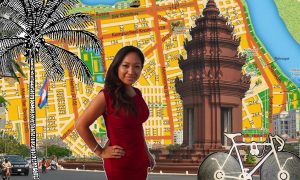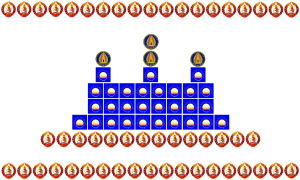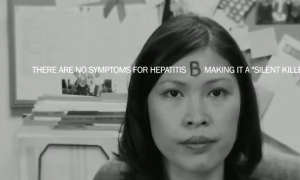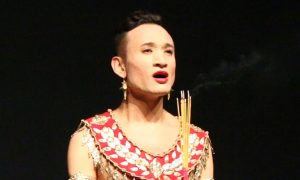By Teresa Tan
Khmerican is a bold word. It is not watered down, not hyphenated as in Khmer-American, not an ambivalent word. It is strong, it is resolute, it is proud.
I am a Khmerican, implies confidence. It describes the synthesis of two strong cultures, to form a bond as one. It implies equality, and identity, and it indeed identifies the Cambodian as well as the American, living symbiotically, in reality or potentially, in one space—a geographic, emotional, social and cultural space.
Dear reader, please do not be confused. The word “Khmerican,” does not indicate the swallowing, nor the asphyxiation, of one culture, or one set of people over another. Rather, it implies the existence of one culture (the Khmer) within the fluid but supportive milieu of the other (the American). Hence, the ability of the Khmer people to take the challenges that the host country has presented to them, especially since the Pol Pot, and the era of the mass exodus from Cambodia and the camps, to this diverse nation we call “America”.
The responsibilities of the Khmerican are many and varied. As a Khmerican, I owe it to my family and to my countries, to be grounded within myself. Acceptance and appreciation of my ethnicity, language and culture– Cambodian or Khmer–will render me a balanced and a giving individual to my host culture, the mainstream American culture. This is why I pursue the Khmer arts, festivals, events and forums and tune in to the Khmerican website or news outlet (Khmerican.com). From this position of knowledge, cultural acceptance and strength, I can embrace and appreciate the offerings of the mainstream American friendships, arts, music and life in America. My motto is “A happy Cambodian, makes an even happier American.” Hence, the significance of being Khmerican.
Other responsibilities that I believe pertain to the Khmerican, are those of loyalty to each culture, assistance to the needs of the underprivileged and an acute awareness of our environment. Additionally, as a balanced and strong Khmerican, I believe I will need to think, act and shine as a role model to youth, especially to troubled youth, and to distorted views held by people on either side of the fence, Khmer or American. Truth is never one-sided. I would strive to extricate the facts and assess each situation fairly and squarely. Pride often gets in the way. Khmer people can be overcome with our own self-importance, and Americans can do the same. A true Khmerican, can operate in each of the cultures with ease, confidence, simplicity, humbleness and good transparency.
In conclusion, you can surely see that the word “Khmerican” carries so much virtue, so much responsibility, so much “light,” and above all, the word Khmerican carries so much pride! I urge all, both young and older, to embrace your status, rejoice in the meaning that the name “Khmerican” carries, and go show the world, how truly remarkable we are as a strong, bold, well-adjusted cultural group!
Thank you for reading these thoughts.
—
First Runner Up
By Yanna Ok
Khmerican to me stands for freedom and privilege. I’m proud to be one of the many first generation Cambodian Americans to go to college. I’m here to represent my family and show them how far they’ve come. Being Khmerican also means opportunity. Some of my Khmer peers forget or overlook the fact of how lucky we are to have family members who survived the genocide. I admit that I even forget how lucky I am to be born in the U.S. Many of our people face a lot of discrimination, which narrows down our options for opportunity, but at least we have the ability express our opinions and troubles with our right of free speech. I may be struggling with what I want to do in this lifetime, but I’m thankful to be given the chance to have an array of options to choose from. Hopefully I can continue the traditions and culture through artwork, so the later generations can carry that on with them.
I’m not only representing my family, but I’m also representing my fellow Khmer Americans. Sometimes it’s a lot of pressure to be the first generation child. Our families have high expectations of us and we have a fear of letting them down. I am lucky enough to come from a town that has a great support system and that wants to see everyone succeed. I wish to someday find my path to success so I can make myself and family proud.
Khmerican to me also means courage. When I’m faced with a tough situation and I’m too afraid to move forward, I think of my family and how much courage it took for them to stay alive. Sometimes I get discouraged of the fact that I’m a woman who’s a minority, but that won’t stop me from trying to strive for what I want. Everyday I’m faced with challenges that can’t compare to what our families faced back in Cambodia, so why should I give up on anything? Being Khmerican is a prize, it’s an honor and victory. To our parents we are like trophies. We are what they were fighting for. None of us should be kept away from the world. We need to be part of the system and spread awareness of our culture. We need to be seen, heard, and represented.
Last but not least Khmerican to me means unity. We’re such a small population of people and when I see other Khmer folks I feel a sense of belonging. I can also get a sense of how much of a struggle it was in the beginning for the parents of other first generation children. In my town there is a fairly large Khmer population, but I rarely get to interact with them. I would love to get to know the young Khmer people in my community and share a connection with them and show them that we can keep Khmer culture alive through awareness and art.
—
Second Runner Up
By Xanthe Tan
“Say it once, bold and clear: Khmerican. Noun. Anyone with a meaningful connection to both Cambodia and America. I am Khmerican. My father is Khmerican. My brothers are Khmerican. Even my Greek mother who has devoted decades to helping the Cambodian community is Khmerican. No disputes there.
Say it twice: Khmerican, Khmerican. Confident. Proud. This is who we are. A shared history of immeasurable beauty and tragedy. Our families seeking greater promise in the United States. We the children blessed with opportunity. Undeniably Khmerican.
Right?
Say it five times fast: KhmericanKhmericanKhmericanKhmericanKhmerican. Syllables fall apart. Words feel funny on the tongue. K-h-m-e-r-i-c-a-n.
Now try it ten times in a row, and we finally have a full-blown identity crisis. The word no longer makes sense. Deconstructed, dismantled gibberish. What does Khmerican mean? What do I mean? And now the questioning, insecurity.
I think: What does it mean to have a shared culture? Perhaps it means being able to communicate. To hear the stories of your elders, to ask questions, read the traditional writings and primary sources of your homeland. If that is the epitome of sharing one’s culture, then what does it mean if I don’t speak my father’s language? Am I still Khmerican?
Khmerican. Maybe sharing your culture means looking like your fellow Khmer comrades. No exchange of words necessary, no confrontation of verbal language, no embarrassment of ignorance. Maybe just a knowing nod on the street, a smile to and from someone who shares your telltale physical features.
What does it mean, then, if I am of mixed heritage? — my face not immediately recognizable as Cambodian.
Khmerican. Maybe all it takes is living out your childhood, growing up, starting a family, and passing down your lineage.
What does it mean, then, if I am queer? What does it mean if I do not marry a man and choose not to have biological children of my own?
Khmerican. Perhaps being a true Khmerican can mean something as simple as sharing the dishes of your motherland and engaging in her rich culinary traditions. Cooking prahok at home, enjoying amok trey at your uncle’s, supporting your local Cambodian restaurants and ordering bai sach chrouk, crawfish, pork…
Then what does it mean if I don’t eat meat? Am I still authentic?
I think about my father, who never once served us Khmer dishes growing up. My father, who grew up with white rice but switched us to brown rice when I was thirteen. Who was too scared to speak Khmer to us as kids because he wanted my brother and me to become masters of English first. My father, who survived the Killing Fields and wanted me to have a promising American life.
Our families didn’t survive and fight for us to feel the confinement of a mere word.
Khmerican.
I slow down.
Khmerican.
Breathe.
Khmerican.
There is no one way to be
Khmerican.
—
The contest was judged by four non-Khmerican staffs: Dr. Shirley Tang, Linda Sok, Chad Phuong, and Rane Kien. Essays were anonymous and was evaluated based on three categories: 1) originality/depth of thought, 2) clarity of expression, and 3) quality. For more information on the Define “Khmerican” Essay Contest, please visit our blog page.














